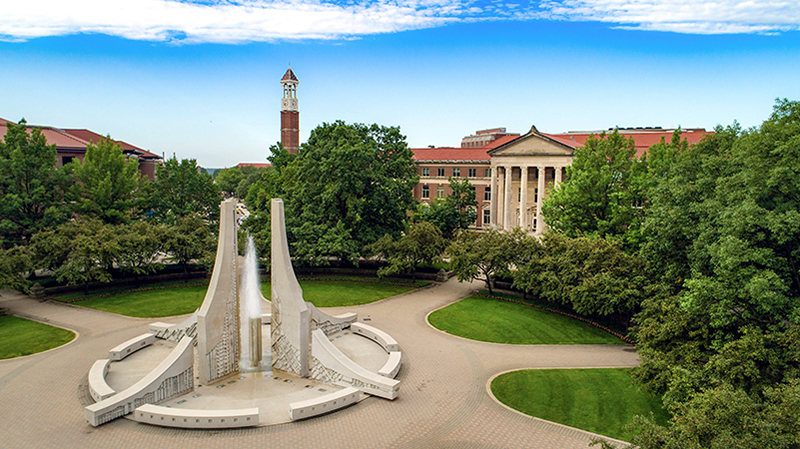July 18, 2023
Purdue Center for Regional Development to support NSF Engines initiative, evaluate regional impact

Federal grant program seeks innovative solutions to boost underperforming regions in US
WEST LAFAYETTE, Ind. – The Purdue Center for Regional Development, as part of the Office of Engagement, has been awarded a one-year contract from the U.S. National Science Foundation (NSF) to establish the framework and process to evaluate the impact of the first-ever NSF Regional Innovation Engines (NSF Engines) competition. The NSF Engines program is a federal grant program intended to stimulate innovation-driven economic growth in every U.S. region, with special attention to underperforming or disadvantaged regions.
The PCRD will work with NSF to develop a robust evaluation framework. This will allow NSF to assess the growth of awarded NSF Engines and gain insights into the program’s impact across the country.
“PCRD is going to be a critical NSF partner to evaluate the impact of the NSF Engines program,” said Roberto Gallardo, vice president for engagement and director of the Purdue Center for Regional Development. “NSF’s objective is to create impactful and sustainable regional engines. With our contribution to the evaluation process, we’ll be helping to tell a powerful story of the impact this program will have across regions in the country.”
Erwin Gianchandani, NSF assistant director for technology, innovation and partnerships, said, "Data and evaluation frameworks are key to determining the success of transformational programs like the NSF Engines. Through this contract, NSF will ensure the NSF Engines program is successfully harnessing the geography of innovation and that the U.S. remains in the vanguard of competitiveness well into the future.”
Additional Information
- Gallardo named vice president of the updated Office of Engagement
- Purdue Center for Regional Development receives CARES Act funding to support small business growth
- Purdue Center for Regional Development staying ahead of the data curve
The NSF Engines program was authorized in the “CHIPS and Science Act of 2022” and aims to strengthen American manufacturing, supply chains and national security, including by investing in research and development, science and technology, and the workforce of the future.
It aspires to catalyze robust partnerships among universities, nonprofits, businesses, state, local and tribal governments, and other organizations, to create positive economic impact within a geographic region to advance national competitiveness and create local, high-wage jobs.
“This program is a bold new initiative aimed at significantly expanding the country’s innovation capacity by investing in key areas of national interest and economic promise in every region of the U.S.,” Gallardo said. “The Purdue Center for Regional Development’s proven experience with regional development, applied research, and data analysis will allow us to examine the successes resulting from the NSF Engines program.”
In June, NSF selected 34 semifinalists for the program and is now assessing these semifinalists to gauge the viability of their projects; their ability to mobilize in the first two years; their competitive advantages; and budget and resources for their planned research and development, translation and workforce development efforts. NSF has described plans to publish a list of finalists later this summer. Each NSF Engine could receive up to $160 million over 10 years.
PCRD will create benchmarks, guidelines and metrics that final recipients will be required to follow to illustrate the effectiveness of the NSF Engines program while aligning with engine-specific evaluation efforts. The NSF Engines span nearly all key technology and societal and economic challenges highlighted in the “CHIPS and Science Act,” including advanced manufacturing, advanced materials, microelectronics and semiconductors, and sustainability, among others.
“As a land-grant university, ensuring regional and national economic prosperity is a core part of our public service mission,” said Karen Plaut, executive vice president of research. “Through the Purdue Center for Regional Development, we are honored to partner with NSF to develop a rigorous framework for measuring the impact of R&D on regional economic growth.”
Gallardo said the initial contract calls for PCRD to develop the evaluation process and training materials.
“The National Science Foundation is a critical partner of Purdue, as it accounts for one-fourth of all federal research expenditures at Purdue, supporting research efforts across all fields,” said Alyssa Wilcox, senior vice president for partnerships and chief of staff. “This partnership reflects Purdue’s capacity not only to innovate but also to measure and document the regional impacts of innovation.”
In addition to the NSF Engines project, the PCRD is part of an academic team evaluating the impact of the Biden administration’s $1 billion Build Back Better Regional Challenge, which aims to boost economic recovery from the pandemic and rebuild American communities, including those grappling with decades of disinvestment. The program is administered through the Economic Development Administration, an agency in the U.S. Department of Commerce.
About Purdue University
Purdue University is a public research institution with excellence at scale. Ranked among top 10 public universities (Times Higher Education/Wall Street Journal and QS), with two colleges in the top 4 in the United States (U.S. News & World Report), Purdue discovers and disseminates knowledge with a quality and at a scale second to none. More than 105,000 students study at Purdue across modalities and locations, with 50,000 in person on the West Lafayette campus. Committed to affordability and accessibility, Purdue’s main campus has frozen tuition 12 years in a row. See how Purdue never stops in the persistent pursuit of the next giant leap, including its first comprehensive urban campus in Indianapolis, the new Mitchell E. Daniels, Jr. School of Business, and Purdue Innovates, at https://stories.purdue.edu.
About the Purdue Center for Regional Development
The Purdue Center for Regional Development (PCRD) seeks to be a leader in innovative and adaptive partnerships empowering regions to find solutions for equitable, sustainable, and resilient development. PCRD will collaborate with people to listen, identify and enhance assets unique to their story, resulting in prosperity and quality of life. Learn more at https://pcrd.purdue.edu/.
Writer/Media contact: Wes Mills, wemills@purdue.edu

